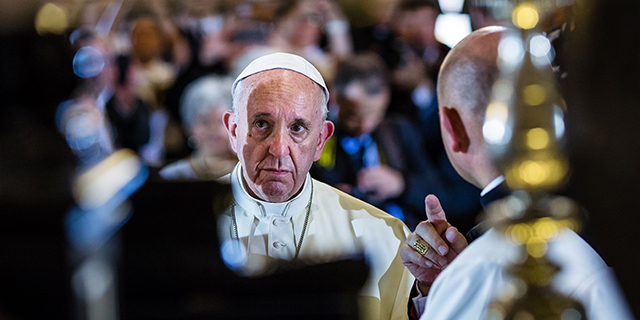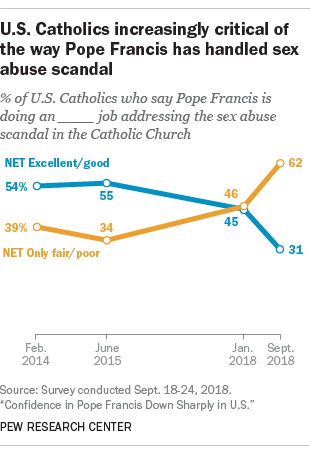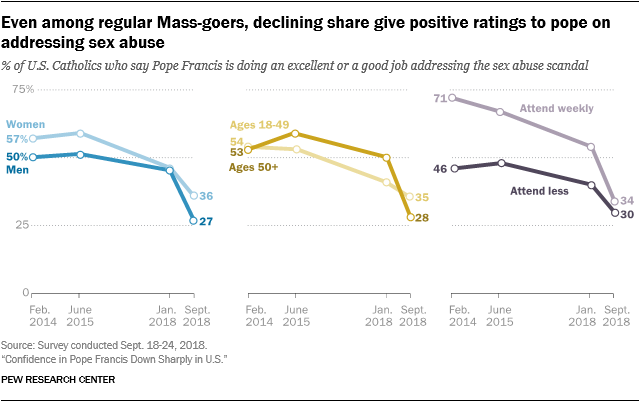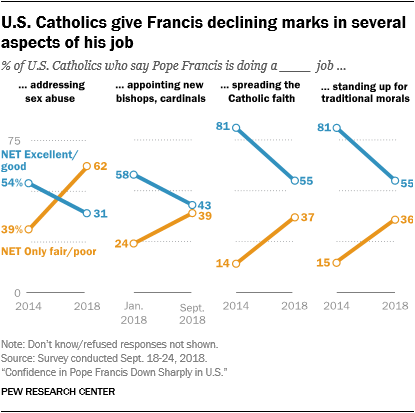
The long-simmering Catholic Church sex abuse scandal has been back in the headlines in recent months, beginning with widespread allegations in June against Theodore McCarrick, the former archbishop of Washington, D.C., who resigned from the College of Cardinals. Soon after came revelations from a Pennsylvania grand jury report that more than 300 priests are accused of sexually abusing minors over the past 70 years. Most recently, Archbishop Carlo Maria Viganò stunned the world when he released a letter charging that Pope Francis and other senior church officials knew about at least some of the abuses and did nothing.
 The accusations have coincided with a drop in the share of U.S. Catholics who approve of the way the pope is handling the abuse crisis. Just three-in-ten American Catholics (31%) now say the pontiff is doing a “good” (18%) or “excellent” (13%) job of addressing the sex abuse scandal, according to a new survey from Pew Research Center. This is much lower than the 54% who gave Francis good or excellent marks in February 2014 (almost a year after he became pope), and the 45% who did so at the beginning of 2018. Meanwhile, 62% of American Catholics now say the pontiff is doing only a “fair” or “poor” job of handling the scandal.
The accusations have coincided with a drop in the share of U.S. Catholics who approve of the way the pope is handling the abuse crisis. Just three-in-ten American Catholics (31%) now say the pontiff is doing a “good” (18%) or “excellent” (13%) job of addressing the sex abuse scandal, according to a new survey from Pew Research Center. This is much lower than the 54% who gave Francis good or excellent marks in February 2014 (almost a year after he became pope), and the 45% who did so at the beginning of 2018. Meanwhile, 62% of American Catholics now say the pontiff is doing only a “fair” or “poor” job of handling the scandal.
The decline in the pope’s standing on the sex abuse issue cuts across age and gender lines. In addition, Catholics who attend Mass regularly are not significantly more likely to rate the pope positively on this issue (34%) than those who do not (30%).
 The new survey also found a decline in American Catholics’ overall approval of Pope Francis. Between January and September of this year, the share of Catholics who express a favorable view of the Pope has dropped from 84% to 72%.
The new survey also found a decline in American Catholics’ overall approval of Pope Francis. Between January and September of this year, the share of Catholics who express a favorable view of the Pope has dropped from 84% to 72%.
 Given this overall drop in papal favorability, perhaps it’s not surprising that American Catholics’ views of the pope on some other issues have been affected as well. For instance, the share of U.S. Catholics who say the pope does a good or excellent job of spreading the Catholic faith has dropped from 81% in 2014 to 55% now. Similarly, while 81% of American Catholics in 2014 gave Francis high marks for “standing up for traditional morals,” only 55% do so today.
Given this overall drop in papal favorability, perhaps it’s not surprising that American Catholics’ views of the pope on some other issues have been affected as well. For instance, the share of U.S. Catholics who say the pope does a good or excellent job of spreading the Catholic faith has dropped from 81% in 2014 to 55% now. Similarly, while 81% of American Catholics in 2014 gave Francis high marks for “standing up for traditional morals,” only 55% do so today.
At the beginning of Francis’ pontificate in 2013, a Pew Research Center survey found that 70% of U.S. Catholics ranked the scandal as “a top priority” for the pope, compared with far fewer who said the same about standing up for traditional moral values (49%) and spreading the Catholic faith (39%).
Francis’ declining rating on the sex abuse scandal mirrors a pattern seen during the papacy of his immediate predecessor, Benedict XVI. By the time of Benedict’s retirement in February 2013, one-third of American Catholics who were following the news of his resignation (33%) rated his handling of the issue as excellent or good – down from roughly half (49%) who held this view five years earlier.




